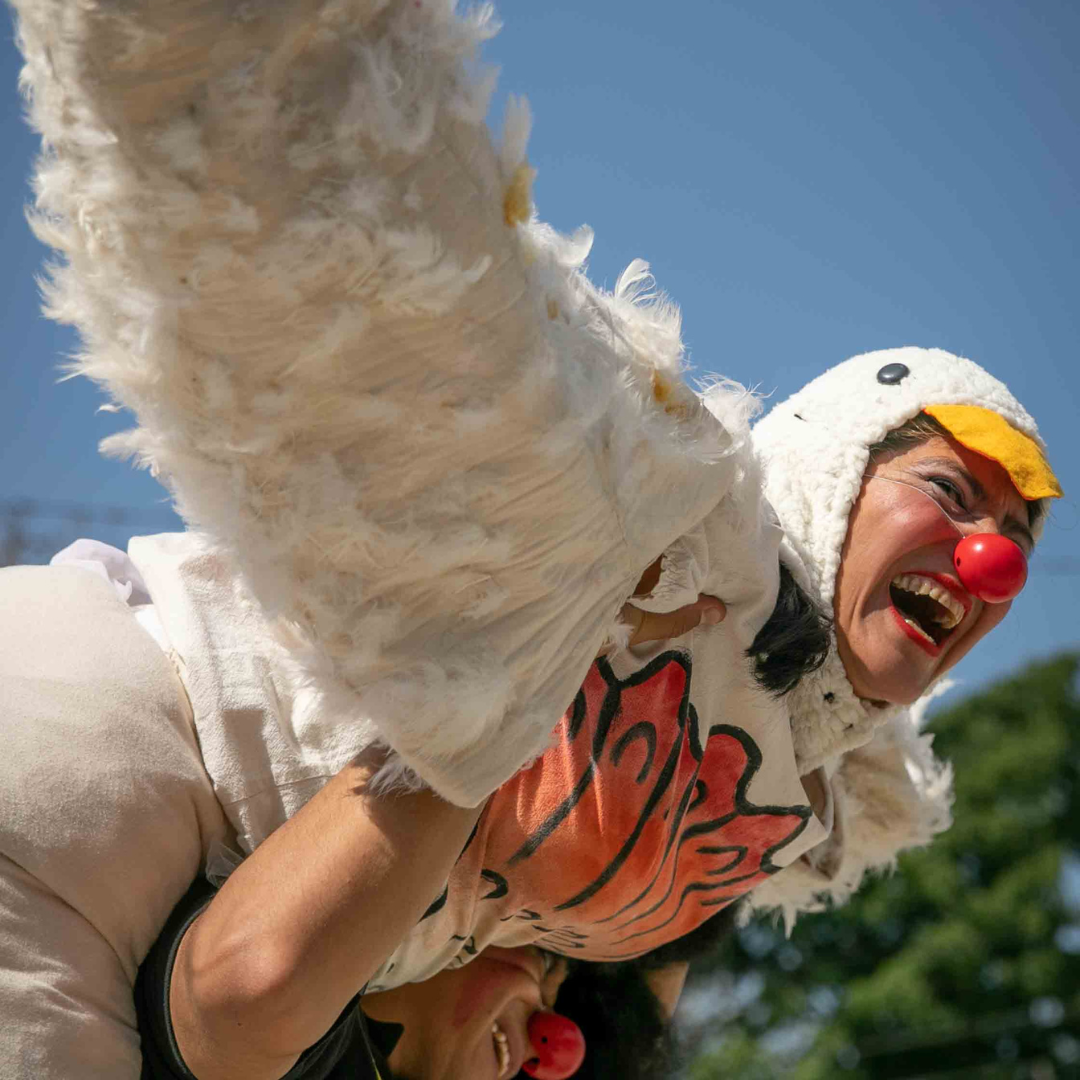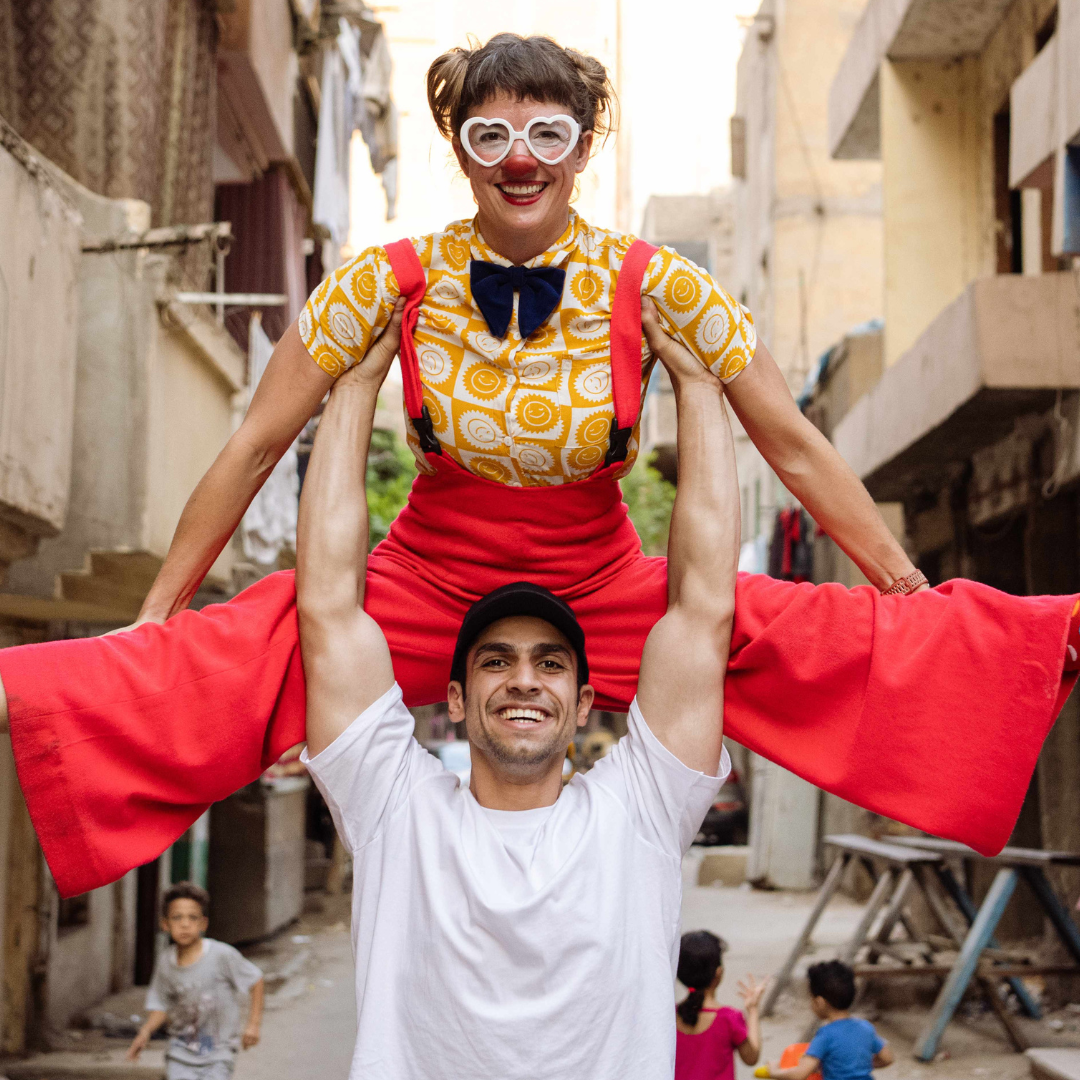Check out our April 20-28 tour in the Bay Area of the United States!
Our Artists
CWB works with over 30 artists a year. The following is a representation to give you a glimpse of their incredible talent.

“Two girls helped me disassemble the cyr wheel with so much love. They had such a desire to help in their every action.”

“The search for a better place to live is as natural as the search for love. The unnatural parts are borders, racism, and xenophobia.”

“When kids are having fun, adults take a deep breath and they can find a little more freedom — even in a space of insecurity.”

“Within the show, there are moments of astonishment, moments of doubt, and moments of reflection, and we see that in the children. What’s happening to us is happening to them.”

“We as clowns, as performers, we…take them anywhere they want to go. But before we can do that, we have to meet them where they are.”

“We tread lightly, and focus on play and human connection. And what we find is that when we can pull people into the world of clown, they are so full of lightness and joy.”

“Two girls helped me disassemble the cyr wheel with so much love. They had such a desire to help in their every action.”
Arturo is Founder and Director of Circo Nacional de Puerto Rico.

“The search for a better place to live is as natural as the search for love. The unnatural parts are borders, racism, and xenophobia.”
Darina is the Founder of Llaven Nü.
Founder of Llaven Nü, member of Atanasia and Red de Payasa Mexicanas. Since 2006, Darina has taught and performed internationally.
It was the day we showed up at Casa de las Mercedes, a shelter for girl survivors of commercial sexual exploitation. The presentation was part of the Riendo Juntas Con CWBUSA project in partnership with Llaven nü and various local organizations.
When the four clowns (Luz Gaxiola, Molly Shannon, Vanessa Nieto and I) arrived at the Casa de las Mercedes to give a performance, as soon as we entered we saw many girls. It was very strong for the four clowns, we knew about the situation that the girls had experienced, seeing them for the first time and at such young ages was very difficult. We went to the designated space to dress up and do the show. For all of them, as we commented on in the review of the day, the feelings before starting the show were confusion, sadness, anger, frustration; etc., at the same time it was very clear to our being that we had to put aside all those feelings for that moment and focus on our great pleasure in trying to make the girls laugh. At first we didn’t connect with them, they almost didn’t laugh, but the miracle of laughing a lot together and connecting was happening. The party took place and we were all one in joy.
The clowns commented that one of the girls who moved us the most was a little girl of around 7 years old. Her look drew a lot of attention because it was not a girl’s look, but a very strong look, in which I could perceive feelings of hatred, disappointment, anger… . The girl, being very distracted, began to empathize and laugh more and more with us clowns and with the story of Begoña the sheep.
At the end of the show, he hugged the clowns, asked us various questions and even learned certain tricks. The most beautiful thing was that her look changed, she already felt the look of a girl who was happy with the show. When we clowns discussed the above, it was beautiful to know that the four of us saw this change in gaze, this transformation that laughter caused in her.
We left the place feeling a lot of love, we send love with gratitude to the girls, their caregivers and the shared joy.

“When kids are having fun, adults take a deep breath and they can find a little more freedom — even in a space of insecurity.”
Hannah is a 3x Fulbright Scholar.
2022 Fulbright Scholar at the Egyptian Academy of Arts in Cairo, a 2023 Fulbright Specialist in Pakistan. The Medical Clown Project. ClownCorps
When we arrive in a new community, I’ll often walk around and play one-on-one with small groups of kids and adults so I can get to know the people and warm up the space before we perform the show. It’s important to me to create a space where people feel invited to play and not required to play. One way I ease into this and invite engagement is with a small plastic squeaker that I carry hidden in the palm of my hand. When I touch something, I secretly squeeze the squeaker and a sound magically happens. When we arrive in the new community, my clown matches the shy but curious energy of the kids and slowly works up the courage to come closer to a child who is equally brave. Once we’re close together, I’ll tentatively reach out my hand with wonder and gently touch the top of their hand. Magically, it squeaks! My clown jumps back with wonder saying “wooooow” and looks at the child as if they are magic. We come close together again, this time the kid reaches their hand toward my clown, wanting to hear the squeak. It happens again, magic! The game continues until many kids are gathered around wanting a turn to have their hands, toes, and bellies squeak and then the game shifts so the kids are all poking my clown in the belly to make it squeak and we’re all laughing!
In the video, we’re in the camp in Tongogara, making our way through the part of camp where people from Mozambique stay. The child in the video was the first brave one to come meet my clown and after the game played out he really wanted to know how the squeak worked. You’ll see in the video that he discovers the squeaker in my palm. Then he proceeds to become a clown himself and continues the game, squeaking all the other children in the neighborhood with a great deal of joy.
Hannah is a theatre creator, therapeutic clown, movement director and teaching artist based in San Francisco. She was a 2022 Fulbright Scholar at the Egyptian Academy of Arts in Cairo, a 2023 Fulbright Specialist in Pakistan, and has taught physical theatre courses and performed around the world. In collaboration with non-profit organizations such as Clowns Without Borders, the Medical Clown Project and ClownCorps, Hannah performs in hospitals, on the street and in care centers locally and internationally, offering laughter relief to children and families who have experienced crisis. Compelled by the transformative power of play, she seeks to facilitate play spaces and collaborative performances that foster connection, shift perspectives and nurture a deeper understanding of our shared human experience.

“Within the show, there are moments of astonishment, moments of doubt, and moments of reflection, and we see that in the children. What’s happening to us is happening to them.”
Lars is the Founder of Los Banyasos.
enNingunlugar, VerdeCerca Circo, Rizoma Laboratorio Escénico, Ar Tsant´i Circo Social, Los Banyasos
My favorite moment was from Guatemala. It was a challenging tour in every way. Due to Covid one of the clowns couldn’t come, and so there were only two of us performing. Eacn performance was an excellent opportunity to prove ourselves as clowns before the different audiences (migrants, indigenous people, girls rescued from human trafficking). What I remember most was our last performance of the tour. It was for an indigenous population in a remote place in the Guatemalan mountains, very close to the border of Mexico.
The children saw us transform into clowns, they were amazed, apparently they had not seen characters like ours. I have a moment in the show, where I put a child on my shoulders and we simulate a freedom flight riding a unicycle. When I approached a child to invite him to come up with me, he didn’t want to, (perhaps shame, insecurity or fear). I tried another one and I didn’t get a favorable response. I tried another one again and nothing. I paused and watched, the energy of a girl caught me, she watched me with confidence and I played. I decided to go towards her. She stands up, the community shouts and applauds her.

“We as clowns, as performers, we…take them anywhere they want to go. But before we can do that, we have to meet them where they are.”
Meredith is a 2019 Tanne Award recipient.
23 Years of experience as a Hospital Clown (Humorology Atlanta, Big Apple Circus Clown Care Unit), 22 Years of Experience as Social Circus coach, (Cirque du Monde, So Cirque Atlanta), Three decades of theater acting.
We finished performing for a group at a refugee camp in Turkey. After the show a group of young girls began to crowd around me. Music was playing, so I took out my spoons and started playing them on my hand and leg.
As the girls saw this, they began to step closer to me. I thought that I would get them more involved. I carefully approached one of the older girls and touched the spoons on her shoulder, keeping the beat of the music. She smiled. Then, another girl came; she wanted me to do the same on her shoulder. This pattern continued with me keeping the beat with the spoons on these girls’ arms. Then some boys noticed and stepped closer, wanting to do the same.
I had a circle of girls and boys around me, laughing and eager to allow me to turn their bodies into percussion instruments.

“We tread lightly, and focus on play and human connection. And what we find is that when we can pull people into the world of clown, they are so full of lightness and joy.”
Circus Center’s Clown Conservatory under the direction of Cirque du Soleil performer Jeff Raz
Robin has been unicycling since she was 10 years old.


